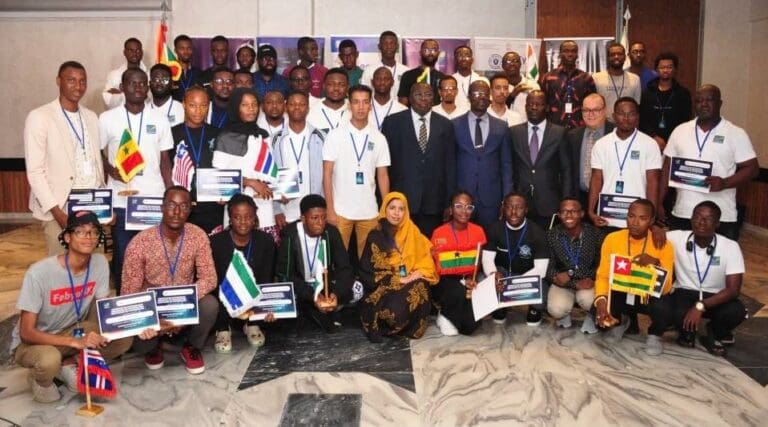APA – Lagos (Nigeria)
The second edition of the ECOWAS Hackathon came to an end with the Team from the Islamic Republic of Mauritanian (Deylol) coming first, with 6750 points, a cheque of $10,000, certification kits and laptops for each member of the team.
The team from Benin, N4tion, came second with 6650 points, a cheque of $8,000 and certification kits, while the Nigerian team, Error, came third with 6250 points, prizes; a cheque of $6,000 and certification kits.
Miss Elizabeth Sheriff from Sierra Leone, won the overall best female with a prize money of $3,000. The other 8 participating teams each got a cheque of 1,000.
The statement by the ECOWAS Commission said that the Commissioner, Infrastructure, Energy and Digital Economy, Mr. Sediko Douka, congratulated all the competing teams and praised their dedication, expertise, talent, resilience and commitment demonstrated throughout the remarkable journey in the last 48 hours.
In his closing remarks, Douka hailed them as the pride of West Africa and role models to all aspiring cybersecurity enthusiasts.
He emphasised the importance of collaboration, innovation and the pursuit of knowledge in the field of cybersecurity, which are very essential in addressing the evolving challenges in the digital world.
He further stated that cyber threats have no borders, emphasizing the significance of regional cooperation and collaboration in effectively countering these threats.
It highlights the importance of a collective effort to safeguard the digital world.
The Commissioner expressed the sincere appreciation of ECOWAS to all of the partners, sponsors and all the individuals who worked tirelessly to make the Hackathon possible: Cyber Defence Africa (CDA), the National Cybersecurity Agency, (ANCy), and the European Union.
Mr. Piero Valabrega, the Head of the European Union Delegation to Togo, expressed the European Union’s commitment to address cybercrime in West Africa through the Organised Crime: West African Response to Cybersecurity (OCWAR-C) project initiative, which seeks to enhance cybersecurity and bolster the resilience of infrastructure, while strengthening the capabilities of those responsible for combatting cybercrime in the region.
Mr. Valabrega also commended the well-organized Hackathon competition, highlighting the enthusiastic participation of key players in the field who are striving to enhance regional cyber-security.
Additionally, he emphasized the importance of encouraging young individuals to engage with the rapidly growing technology industry, which is crucial for the region’s development and security.
The representative of the Ministry of Security and Civil Protection, Mr. Kpatcha Tchendo, commended the participants, recognizing them as the future of West Africa.
He lauded their role as agents of change and ambassadors of integration in the realm of cybersecurity.
Mr. Tchendo emphasized the importance of continuous learning, skill development and knowledge sharing within the cybersecurity industry, acknowledging its ever evolving nature.
He stressed that staying up-to-date with new technologies is crucial to safeguarding the cyber space of West Africa.
Mr. Tchendo in closing, expressed the Togolese government’s deep gratitude to all participants and event organizers for choosing Togo as the host for this significant event.
He urged all involved to remain committed to forging and strengthening both bilateral and multilateral partnerships. This commitment is essential for effectively implementing mechanisms that will progressively guide West African Member States towards modernization.
The Hackathon sole’s aim is to highlight the cybersecurity challenges facing the sub-region, while encouraging the creation of innovative solutions to deal with online threats.
Forty-three of the most talented young people from 11 countries took part in this competition.
GIK/APA
Team Deylol from Mauritania wins 2023 ECOWAS Hackathon


